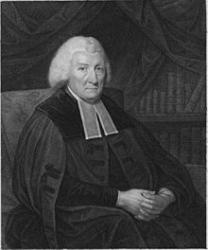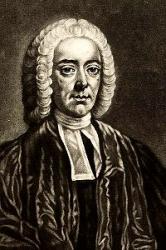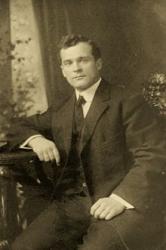Planning worship?
Check out our sister site, ZeteoSearch.org,
for 20+ additional resources related to your search.
- |
User Links
Person Results
George Burder

1752 - 1832 Person Name: Burder Author of "Jesus, immortal King, arise" in Worship in the School Room Burder, George, born in London, June 5, 1752, and trained as an engraver. At the age of 24 he commenced preaching with the Calvinist Methodists, but subsequently joined the Congregationalists,and was pastor sucessively at Lancaster, Coventry, and Fetter Lane, London. He was one of the active founders of the Religious Tract, the London Missionary, and the British and Foreign Bible Societies, and some time editor of the Evangelical Magazine. He died May 29, 1832. His works include Village Sermons, 1704; Sea Sermons, 1821; Cottage Sermons, 1826, and others. He is known to hymnology by his Collection of Hymns from various Authors, intended as a Supplement to Dr. Watts, &c, 1784. (Preface dated Nov. 20, 1784.) It had attained to the 25th edition in 1827. To this collection he contributed 4 hymns, the best known being, "Sweet the time, exceeding sweet" (q.v.), sometimes altered to "Great the joy when Christians meet." The remaining three, all from the 1st edition 1784, are:—
1. Come, dear Desire of nations, come. Missions.
2. Come ye that know and fear the Lord. Love of God. In Dr. Hatfield's Church H. Bk., N.Y., 1872, 5 st. out of 9 are given as No. 236.
3. Lord, solemnize our trifling minds. Before Sermon. Altered to "Great God, impress our trifling minds," in the New Congregational Hymn Book, No. 786, &c.
Burder's Collection is of importance in the history of Congregational hymnody. The 1st edition, 1784, contained 187 hymns; 2nd edition, 1784, 211; 9th edition, 1803, 257 hymns; 18th edition, 1820, 277; and the last, the 25th edition, 1827, 294. His son, Henry Foster Burder, published a Collection of Ps. & Hymns, 1826; and another son, the Rev. John Burder, also compiled a Collection published without date. To the 18th edition, 1820, of G. Burder's Collection, the wife of his son H. F. Burder contributed "And will the God Who reigns on high " (Sunday Schools), under the signature “S. M. Burder" [Sophia Maria].
-- John Julian, Dictionary of Hymnology (1907)
George Burder
Hugh Blair

1718 - 1800 Person Name: Hugh Blair, 1718-1800 Author of "Come Unto Me, All Ye Who Mourn" in The Cyber Hymnal Blair, Hugh, D.D., eldest son of John Blair, merchant. Edinburgh, was born at Edinburgh, April 7, 1718. In 1730 he entered the University of Edinburgh, where he graduated M.A. in 1739. In 1742 he was ordained parish minister of Collessie, in Fife, became, in 1743, second minister of the Canongate, Edinburgh, in 1754 minister of Lady Yester's, and in 1758 joint minister of the High Church (now styled St. Giles's Cathedral). In 1762, while still retaining his pastoral charge, he was appointed the first Professor of Rhetoric in the University of Edinburgh—a chair founded for him. He received the degree of D.D. from the University of St. Andrews, in 1757. He died in Edinburgh, Dec. 27, 1800.
In 1744 Dr. Blair was appointed a member of the Committee of Assembly which compiled the Translations and Paraphrases of 1745, and in 1775 of that which revised and enlarged them. To him are ascribed by the Rev. W. Thomson and the Rev. Dr. Hew Scott, Nos. 4, 33, 34, 44, of the 1781 collection. He is also credited with the alterations made on Paraphrases 32 and 57, in 1745-51, and on Paraphrase 20, in 1781. The Rev. J. W. Macmeeken would ascribe these 4 Paraphrases to his second cousin, the Rev. Robert Blair, author of The Grave [eldest son of the Rev. David Blair, born in Edinburgh, 1699, ordained Parish minister of Athelstaneford, East Lothian, in 1731,appointed, in 1742,a number of the Committee which compiled the 1745 collection, died at Atholstaneford. Feb. 4, 1746]. Dr. C. Rogers, in his Lyra Britannica (pp. 66 & 664, ed. 1867) holds that, though Dr. Hugh Blair may have altered Paraphrases 44 and 57, neither he, nor Robert Blair, wrote any original hymns. While the weight of opinion and of probability is in favour of Dr. Hugh Blair, no very definite evidence is presented on either side, though the records of the Presbytery of Edinburgh in 1748 show Dr. Hugh Blair as selected to revise Nos. 18 (7 in 1781), 21 (46 in 1781), and probably others. [Rev. James Mears, M.A.]
-- John Julian, Dictionary of Hymnology (1907)
Hugh Blair
Michael E. Young
b. 1939 Composer (descant) of "ST. ANNE" in Christian Worship (1993) b. 6-25-39, San Francisco; composer, organist
LOC Name Authority File
Michael E. Young
James Hervey

1714 - 1758 Person Name: Rev. James Hervey (1714-1758) Author of "Since all the varying scenes of time" in Carmina Sanctorum Hervey, James, M.A., son of the Rector of Weston-Favell and Collingtree, diocese of Peterborough, was born at Hardingstone, near Northampton, Feb. 14, 1714, and educated at the Free Grammar School, Northampton, and Lincoln College, Oxford. At Oxford he had John Wesley, then a Fellow of Lincoln, as his tutor. Ordained in 1736, he assisted his father for a short time, and then became Curate of Dummer. At the end of a year he passed on to Devonshire, first as a guest of Mr. Orchard, at Stoke Abbey, and then as Curate of Bideford. In 1742 he left Bideford and rejoined his father, whom he succeeded as Rector of Weston-Favell and Collingtree in 1752. He died Dec. 25, 1758. His controversial and religious writings were very popular at one time, but have fallen out of use. His Meditations among the Tombs (suggested by a visit paid to Kilkhampton Church, Cornwall), Reflections on a Flower Garden, and a Descant on Creation, were published in one volume in 1746; and his Contemplations on the Night, and The Starry Heavens, with A Winter Piece, were published as a second volume in 1746. A complete edition of his Meditations and Contemplations were published with a Memoir (Lond., W. Tegg) in 1860. From these the following hymns have come into common use:—
1. Make the extended skies your tomb. The True Life. This was given in the Meditations among the Tombs, 1746, in 4 stanzas of 4 lines as the conclusion of a meditation on “The only infallible way of immortalizing our characters":—
"The only infallible way of immortalizing our characters, a way equally open to the meanest and most exalted fortune is, 4 To make our calling and election sure/ to gain some sweet evidence that our names are written in heaven.”.....
"Make the extended skies your tomb;
Let stars record your worth," &c.
Its use in modern hymn-books is limited.
2. Since all the downward tracts of time. Providence. This appeared in the Reflections on a Flower Garden, 1746, in 3 stanzas of 4 lines. It is given as a note to the following sentence: "Be still, then thou uneasy mortal: know that God is unerringly wise; and be Assured that, amidst the greatest multiplicity of beings, be does not overlook thee.".....
" *Permittas ipsis expendere numinibus, quid
Conveniat nobis, rebusque tit utile nostris.
Nam pro jucundis aptissima quoeque dabunt dii:
Carior est illis homo, quam sibi. —Juv.
"Since all the downward tracts of time
God's watchful eye surveys;
0! Who so wise to choose our lot,
And regulate our ways?
"Since none can doubt His equal love,
Unmeasurably kind;
To His unerring, gracious will
Be ev'ry wish resign'd.
“Good when He gives, supremely good
Nor less, when He denies:
E'en crosses, from His sovereign hand,
Are blessings in disguise."
In addition to this hymn being in common use in this its original form, it is often found in 5 stanzas and beginning, “Since all the downward tracks of time."
-- John Julian, Dictionary of Hymnology
James Hervey
H. Ellis Wooldridge
1845 - 1917 Person Name: H. E. W. Arranger of "[O God, our help in ages past]" in Hymns b. 3/28/1845, Winchester; d. 2/13/17, London; English music scholar
LOC Name Authority File
H. Ellis Wooldridge
Donald D. Kettring
1907 - 1981 Person Name: Donald D. Kettring, 1907- Descant of "ST. ANNE" in Pilgrim Hymnal
Donald D. Kettring
Edward Osler

1798 - 1863 Person Name: E. Osler Author of "O God, unseen, yet ever near" in The Academic Hymnal Osler, Edward, was born at Falmouth in January, 1798, and was educated for the medical profession, first by Dr. Carvosso, at Falmouth, and then at Guy's Hospital, London. From 1819 to 1836 he was house surgeon at the Swansea Infirmary. He then removed to London, and devoted himself to literary pursuits. For some time he was associated with the Society for Promoting Christian Knowledge, both in London and at Bath. In 1841 he became the Editor of the Royal Cornwall Gazette, and took up his residence at Truro. He retained that appointment till his death, at Truro, March 7, 1863. For the Linnaean Society he wrote Burrowing and Boring Marine Animals. He also published Church and Bible; The Voyage: a Poem written at Sea, and in the West Indies, and Illustrated by papers on Natural History, 1830; The Life of Lord Exmouth, 1837, &c. His hymnological work is mainly connected with the Mitre Hymn Book. During 1835-36 he was associated with Prebendary W. J. Hall, the editor, in producing that collection, which was published in 1836 as Psalms and Hymns adapted to The Services of the Church of England. He resided in Mr. Hall's house during the time. From the "hall manuscript" we gather that he contributed 15 versions of the Psalms (5 being rewritten from others), and 50 hymns (a few rewritten). Most of these hymns and Psalm versions, together with others not in the Mitre Hymn Book, were afterwards given in the monthly numbers of his Church and King, from Nov. 1836 to Aug. 1837. The best known of these hymns are, “O God, unseen, yet ever near," and “Worship, honour, glory, blessing." Several of his hymns in common use are:—
1. Father, Whose love and truth fulfil. Holy Baptism.
2. Glory to God! with joyful adoration. Praise to the Father.
3. Great God, o'er earth and heaven supreme. Men the Stewards of God's Bounties.
4. Great God of hosts, our ears have heard. Ps. xliv. Based on the N. Version.
5. Great God, Whose awful mystery. Holy Trinity.
6. I hold the sacred book of God. Martyrs.
7. Jehovah hath spoken, the nations shall hear. Second Advent.
8. Lord, may the inward grace abound. Holy Baptism.
9. May we Thy precepts, Lord, fulfil. Love.
10. Mighty Saviour, gracious King. Advent.
11. 0 God, the help of all Thy Saints. Ps. x.
12. O Thou, the Lord and Life of those. Christ the Life of Men.
13. O Saviour, Who didst come. Easter.
14. Saviour, Whose love could stoop to death. Easter.
15. See, Lord, before Thy mercy seat. For Schools.
16. Set in a high and favoured place. Advent.
17. Wake frem the dead, new life begin. Lent.
18. With trembling awe we come. Lent.
Several of these hymns are not in Osier's Church and King. We have ascribed them and others to him on the authority of the "hall MSS." It must be noted also that the text in the Church and King often differs from that in the Mitre.
--John Julian, Dictionary of Hymnology (1907)
Though not mentioned by Julian, perhaps his most enduring contribution to hymnody is the third stanza of "Praise the Lord! Ye Heavens, Adore Him", whose first two stanzas are of anonymous authorship.
--Leland Bryant Ross (2019)
Edward Osler
Terry W. York
b. 1949 Author of "Living Stones" in Celebrating Grace Hymnal Terry W. York is Professor of Christian Ministry and Church Music at Baylor University’s George W. Truett Theological Seminary. He joined the faculty in 1998 after serving three years as the Associate Pastor of Park Cities Baptist Church in Dallas, TX. He received the Bachelor of Arts degree from California Baptist University and his Master of Church Music and Doctor of Musical Arts degrees from New Orleans Baptist Theological Seminary.
He has been Minister of Music in churches in California and Arizona. From 1984-1995 he served at the Baptist Sunday School Board (now LifeWay Christian Resources) in Nashville, TN. His duties there included being the Project Coordinator for The Baptist Hymnal, 1991. In all, Dr. York has published more than 40 hymns including the well-known Worthy of Worship. His hymn Give Us Courage was commissioned by the Truett Seminary administration and approved by the Truett Seminary faculty as the official Seminary Hymn in 2006. In addition to his hymns, Dr. York has published more than 60 choral anthem texts set by composers such as Bob Burroughs, David Danner, Tom Fettke, Benjamin Harlan, Mary McDonald, Earlene Rentz, David Schwoebel, Joseph Martin, Vicki Hancock Wright, Taylor Scott Davis, and Dan Goeller.
The Worship Matrix, co-authored with David Bolin (Celebrating Grace, Inc., 2010), is the fourth of Dr. York’s books to have been translated into Chinese. In June 2008 it was his privilege to be one of two featured plenary speakers at The World Association of Chinese Church Musicians’ biannual conference which met in Kuching, Malaysia. In June 2009, the Baptist Church Music Conference, meeting in Nashville, TN, gave Dr. York the W. Hines Sims Award, its most prestigious recognition.
Many of Dr. York’s anthems, books, hymns, sermons, essays, and poems can be accessed on the website he shares with David Bolin, www.textandtune.com.
Dr. York and his wife, Janna, have two children and three grandchildren.
--Email from Terry W. York to Tina Schneider, 2 May 2014. DNAH Archives
Terry W. York
Harry Webb Farrington

1880 - 1930 Person Name: Harry Webb Farrington, 1880-1931 Author of "O God, creator, in whose hand" in The Hymnal
Harry Webb Farrington
Pauline Martin
Translator (French) of "O God, our help in ages past" in Cantate Domino
Pauline Martin


 My Starred Hymns
My Starred Hymns

